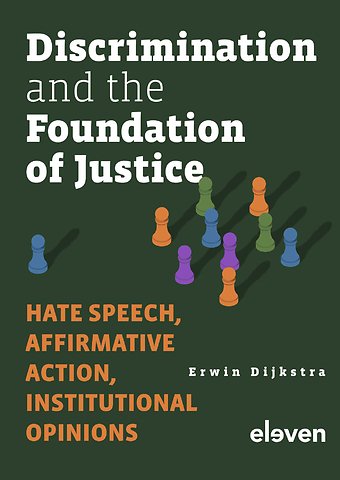Discrimination and the Foundation of Justice
Hate Speech, Affirmative Action, Institutional Opinions
Samenvatting
Discrimination is still not sufficiently addressed within liberal democracies. Often only some groups are protected against discrimination and merely in certain situations. This leaves many who suffer because of discrimination without recourse. And that is only one of the dilemmas with group-based approaches to the protection against discrimination. So why are these approaches so common? And can we find a viable alternative?
In this new book, legal scholar Erwin Dijkstra answers these questions. His analysis is thorough, original, and thought-provoking. This makes Discrimination and the Foundation of Justice indispensable for anyone who seeks a better understanding of discrimination law, the relevant human rights context, and the debate on improving the protection against discrimination. That debate is brought to life through a thoughtful discussion of hotly debated topics like hate speech, affirmative action, and institutions that speak out against discrimination. As discrimination concerns us all, this book was written as a resource for all. It is meant to be read by those studying discrimination law professionally and the broader public alike.
Trefwoorden
Specificaties
Inhoudsopgave
ABBREVIATIONS xv
INTRODUCTION: MODERN TRAGEDIES
1. Two Premises, Three Questions 1
2. Modern Tragedies 7
3. Modern Dilemmas 11
4. Methodological Remarks 19
5. Trajectory of this Work 23
PART ONE: THE FOUNDATION OF JUSTICE
CHAPTER I: LIBERALISM, POWER, AND THE INDIVIDUAL
6. Liberalism and Humanism 29
7. Liberalism as a Political Program 34
8. Four Liberal Concerns 38
9. Liberalism and Democracy 43
10. Liberalism and Human Rights 47
CHAPTER II: THE MODERN HUMAN RIGHTS DISCOURSE
11. An Exclusionary Heritage 51
12. Whose Rights? What Universality? 57
13. Three Generations of Rights 64
14. Human Rights Overreach 73
15. Politics of Contestation 81
CHAPTER III: A LIBERALISM OF FEAR
16. The Need for a Liberalism of Fear 85
17. Vulnerability as a Telos 95
18. (In)justice and a Liberalism of Fear 101
19. Dignity and a Liberalism of Fear 115
20. Capabilities and Discrimination 120
CHAPTER IV: DISCRIMINATION AND THE RECHTSSTAAT
21. The Rechtsstaat 131
22. Five Characteristics 139
23. A Dynamic-Cultural Approach 143
24. Two Relationships, Three Spheres 144
25. What is Discrimination? 151
PART TWO: GROUP-BASED APPROACHES TO DISCRIMINATION
CHAPTER V: HATE SPEECH
26. The Foundations of Criminal Law 163
27. The Dutch Hate Speech Ban 174
28. The Genesis of the Protected Categories 184
29. Five Dilemmas with Hate Speech Bans as Group Rights 190
30. Conclusion & Evaluation 200
CHAPTER VI: AFFIRMATIVE ACTION
31. The Foundations of Private Law 209
32. Affirmative Action in the Netherlands 226
33. The Genesis of the Protected Category 239
34. Five Dilemmas with Affirmative Action as a Group Right 244
35. Conclusion & Evaluation 256
CHAPTER VII: INSTITUTIONAL OPINIONS
36. The Foundations of State Neutrality 263
37. Institutional Opinions in the Netherlands 280
38. The Genesis of the Protected Categories 293
39. Five Dilemmas with Institutional Opinions as Group Rights 297
40. Conclusion & Evaluation 308
PART THREE: CONCLUSION AND MISCELLANEOUS
CONCLUSION: AN ILLUSION OF JUSTICE
41. An Illusion of Justice 317
42. A Theory of Everything? 327
43. Compassion and Fundamental Rights 331
GLOSSARY 339
RELATED PUBLICATIONS 341
BIBLIOGRAPHY 343
INDEX 379
Anderen die dit e-book kochten, kochten ook
Net verschenen
Rubrieken
- aanbestedingsrecht
- aansprakelijkheids- en verzekeringsrecht
- accountancy
- algemeen juridisch
- arbeidsrecht
- bank- en effectenrecht
- bestuursrecht
- bouwrecht
- burgerlijk recht en procesrecht
- europees-internationaal recht
- fiscaal recht
- gezondheidsrecht
- insolventierecht
- intellectuele eigendom en ict-recht
- management
- mens en maatschappij
- milieu- en omgevingsrecht
- notarieel recht
- ondernemingsrecht
- pensioenrecht
- personen- en familierecht
- sociale zekerheidsrecht
- staatsrecht
- strafrecht en criminologie
- vastgoed- en huurrecht
- vreemdelingenrecht







